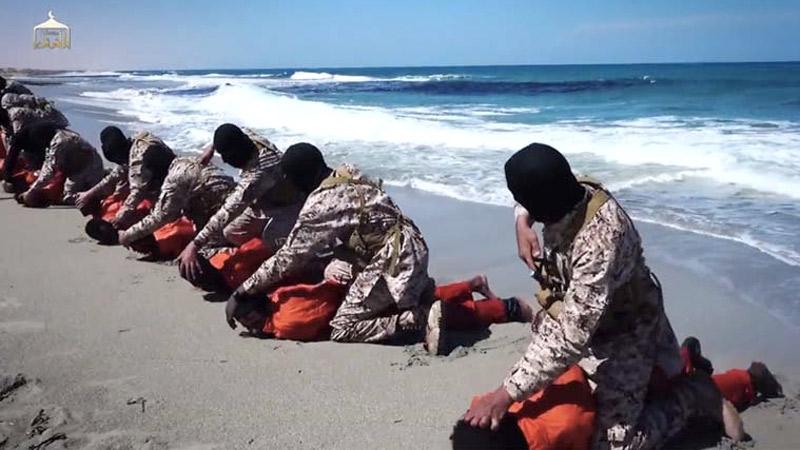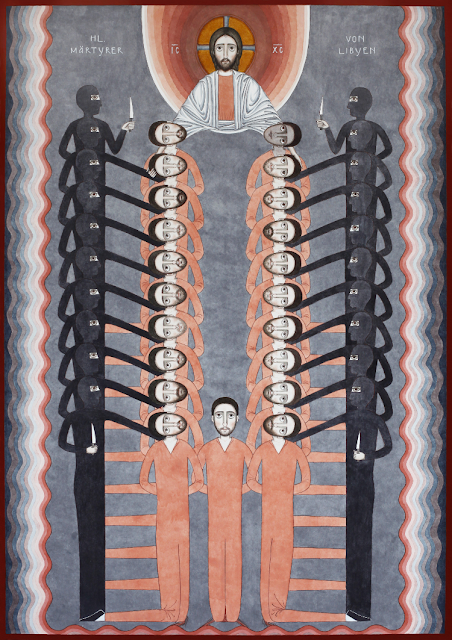Eight Years Since ISIS Beheadings Of Innocent Coptic Christians
In 2015, ISIS terrorists beheaded 21 Egyptian Coptic Christians and warned other 'followers of the Cross.'

This week [Feb. 12] marks the eighth anniversary since the terrifying yet inspirational video of the martyrdom of 21 men in Libya was released. The warm Mediterranean lapped gently onto the beach where, just a few years before, indulged and indulgent tourists drank cocktails as they soaked up the sun.
Twenty-one men, dressed in orange jumpsuits, were led out by black-clad figures, each armed with a knife. One of the terrorists spoke in English addressing the “followers of the Cross” and, pointing towards Europe, warned of Rome’s imminent fall. Then, with the holy name of Jesus on their lips, refusing to renounce their Lord and Saviour, each of the men in the jumpsuits was beheaded.
When I give talks on the persecuted Church, I usually finish with an account of those men now known as the 21 Coptic Martyrs of Libya. I do this because their witness and martyrdom is so extraordinary and important for those of us who claim to follow Christ to both know and, if necessary, imitate.
In 2015, ISIS, the so-called Islamic State, was sweeping across many parts of the Middle East, the very cradle of Christianity. Many people only think of Israel and Palestine as the Holy Land, but, as we know, the Lord and His disciples walked and taught in much of the Middle East, including Egypt, Syria, and Lebanon. His disciples evangelized in Iraq as well. These countries are just as much the Holy Land as the place of the Lord’s birth.
Let us be in no doubt, the aim of the Islamic State, as with all Jihadists, is the total elimination of Christianity from the lands of its birth. If Christians are allowed in these countries, they must be totally subjugated and live as second-class citizens.
ISIS, as is well known, offered three choices: to convert to Islam, to leave, or to die. It is alleged that Christians were offered the jizya, a special tax traditionally levied against non-Muslims who live in Islamic society. However, the amount of money, certainly in the ancient city of Mosul, was so exorbitant that it was impossible to pay. That left Christians three options: conversion, expulsion, or death.
I have met many people who chose to leave everything they had—the homelands where their families had lived for hundreds, if not thousands, of years, their houses, and even their clothes—because they would not deny Christ. I have also met, sadly, very few people, who, for whatever reason, chose to convert. They are haunted, but have been forgiven and accepted by the Christian community. They cannot return to their homes because they are now considered apostates of Islam and will be killed.
As these eight years have gone by since the martyrdom of The 21, my veneration of these extraordinary men has only grown.

Icon of the Holy Martyrs of Libya (2015), a 100 x 70 cm watercolour on paper by Nikola Saric.
They were all, except one, simple Egyptian laborers, mainly from one or two traditionally Christian villages in Egypt. They were members of the Coptic Church, founded, it is believed, by St. Mark the Apostle. They were working in Libya—yet another country destroyed by so-called nation building—to send money home to support their families. They were simple, poor men, but in their death and their witness, they were and are giants of the Faith.
When the moment came—which in some sense we will all have to face—to either accept Christ and His message in its fullness or to deny it, they chose Christ. The consequence was death, a most brutal and horrible death. They died with the name of Jesus on their lips. Their companion, Matthew, a Ghanaian who was not a Copt, died with them and is considered a saint of the Coptic Church. It is believed he was offered the choice to renounce Christ in order to live, but he stood with his brothers.
As St. Paul says in one of his letters, we have not yet been called to pay the price of our faith in blood. But all around us there is a call and the temptation to deny Him and His message about life, family, and the reality of God’s plan for men and women. For the sake of an easier life, we must pay, in some sense, a secular jizya, to be ‘allowed’ to live as Christians in contemporary culture. We do not, as yet, face the choice ISIS gave many of the Christians in the Middle East.
It appears The 21 were not even given the choice to leave; just conversion or death. However the time of reckoning is close; it is even upon us. Already in England, for example, priests and laity are being arrested for the ‘crime’ of praying in public, or having the ‘wrong’ bumper sticker on a car. Medical staff, both in the United States and other countries, are unable to find employment if they refuse to abort babies. It is now impossible for most politicians in the West to define what woman is, something the ‘greatest generation’ would find the stuff of science fiction or comedy.
Let these giants, the 21 Coptic Martyrs of Libya, these poor, simple, faithful men, strengthen us. Let their example give us fortitude to follow Him wherever He leads, and if it costs nothing less than everything, so be it.
Fr. Benedict Kiely is the founder of Nasarean.org, a charity helping persecuted Christians. He writes for the European Conservative.